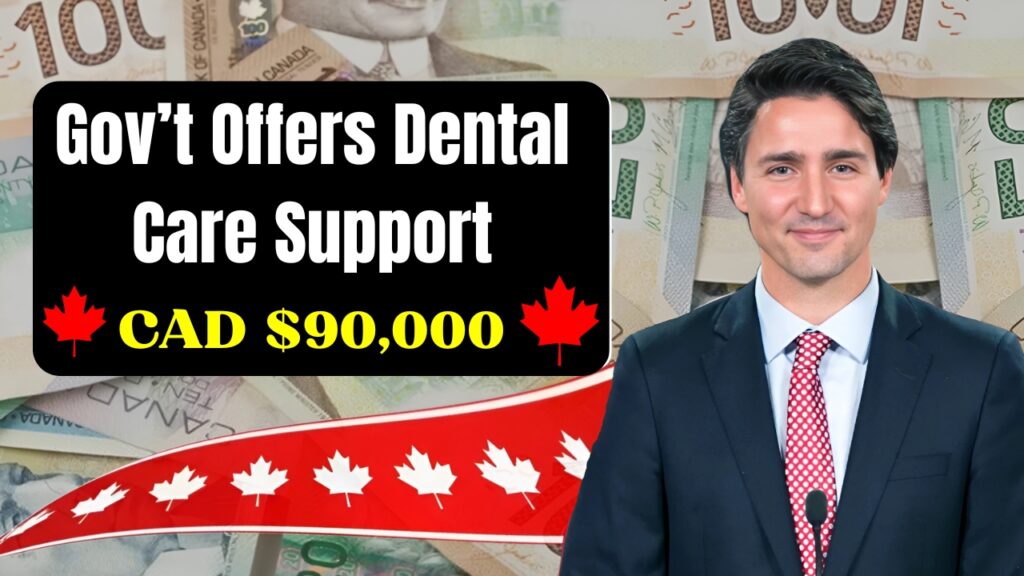
Canada’s healthcare system covers medical needs for free, but dental care has always been different. For decades, 60% of Canadians relied on employer-provided insurance while 35% paid completely out of their own pockets. Only 4-6% of the population received publicly funded dental coverage CAD $90,000 through limited third-party programs.
This left many seniors without adequate dental care due to factors such as being uninsured or underinsured, as well as challenges related to accessing care when mobility and independence decline. The situation became critical as seniors struggled with rising costs of prescription medications, home heating, food, and gas, along with poor returns on their savings.
The Canadian Dental Care Plan (CDCP) represents a historic shift in Canada’s approach to oral health. This initiative marks a historic step toward integrating dental care into the broader spectrum of health services, acknowledging oral health’s critical role in overall well-being.
How the CDCP Works for Seniors
The program specifically targets seniors aged 65 and over who meet four critical eligibility requirements:
| Eligibility Requirements | Details |
|---|---|
| Age Requirement | Must be 65 years or older |
| Income Threshold | Adjusted family net income below $90,000 annually |
| Insurance Status | No access to dental insurance through employment, private plans, or family coverage |
| Tax Filing | Must have filed Canadian tax returns and received notice of assessment |
Coverage and Co-payment Structure
The CDCP isn’t completely free for all participants. Depending on your family’s income, you may need to pay a percentage of the cost. Seniors with adjusted family net income between $70,000 and $89,999 will need to pay co-payments directly to their dentist.
To date, more than 90,000 seniors have received care from participating providers. For some seniors, it is their first time seeing an oral health provider in decades.
Real Impact: 2 Million Seniors Already Approved
The numbers tell a powerful story of transformation. This week two million Canadian seniors will have been approved to receive coverage under the Canadian Dental Care Plan (CDCP) and will be able to access the dental care they need.
Provider Participation Growth
There are currently close to 10,000 oral health providers offering a wide-range of services to patients covered under the CDCP. This includes dentists and dental specialists, independent dental hygienists and denturists.
Key Challenges Facing Senior Implementation
Provider Acceptance Concerns
A crucial factor in the success of the proposed CDCP is the willingness of dental professionals (dentists, independent practice dental hygienists, and denturists) to accept senior clients under the new remuneration scale. Presently, there appears to be resistance from dentists and their associations in Canada.
Awareness and Education Gaps
Many dental offices lack complete information about the program. Many dental offices are not fully informed, even after recent updates and information from Health Canada on the application process. This creates barriers for seniors trying to access care.
Terminology Confusion
A notable limitation of the program is its name, which utilizes the term “dental” instead of “oral”. This choice of wording may lead to misinterpretation. Many seniors who wear dentures believe they don’t need “dental” care, not understanding that regular oral health examinations remain crucial.
Cultural and Language Barriers
Cultural barriers, contextual factors and life circumstances, oral health literacy and recent immigration status, particularly for senior immigrants who are parents of recent immigrants, can pose additional challenges in enrollment, and accessing information and services provided by the CDCP.
What Services Are Covered Under the CDCP
Starting November 1, 2024, a wider range of essential treatments, including partial dentures, crowns, and higher levels of sedation, became available to CDCP patients through the launch of preauthorization.
The program emphasizes preventive care while also covering essential treatments that seniors need most. However, many of the established fees covered by the federal government do not meet the full cost of the treatment in a dental office. The difference will be on you.
How to Access the CDCP as a Senior
All eligible Canadians can now apply for the Canadian Dental Care Plan (CDCP). You must meet all 4 of the eligibility requirements before applying.
Application Process:
- Verify eligibility at canada.ca/dental
- Apply online through My Service Canada Account
- Wait for welcome package from Sun Life
- Receive member card with coverage start date
Check your eligibility on the Canadian government website or contact its helpline at 1-833-537-4342 between 8:30 a.m. to 4:30 p.m. local time, Monday to Friday.
Future Expansion and What’s Next
The program continues expanding beyond seniors. All remaining eligible Canadians aged 18 to 64 years-old will be able to apply for the CDCP in May 2025; with coverage starting as early as June 1, 2025.
Renewal Requirements
From March 2025 onward, current CDCP members must take action to renew their coverage. CDCP members must submit their renewal applications by June 1, 2025, to ensure uninterrupted coverage.
Frequently Asked Questions
Q: Is the CDCP completely free for seniors?
A: Not always. Seniors with family income between $70,000-$89,999 pay co-payments, plus any difference between CDCP fees and actual treatment costs.
Q: Can I keep my current dentist with the CDCP?
A: Only if your dentist participates in the program. Participation in the CDCP is voluntary. Check Sun Life’s provider directory or ask your dentist directly.
Q: What if I already have some government dental coverage?
A: If you have dental coverage through a provincial, territorial or federal government social program, you can still qualify for the CDCP. Benefits will be coordinated between programs.
New Social Security Change May Force Millions to Visit Local Field Offices Again